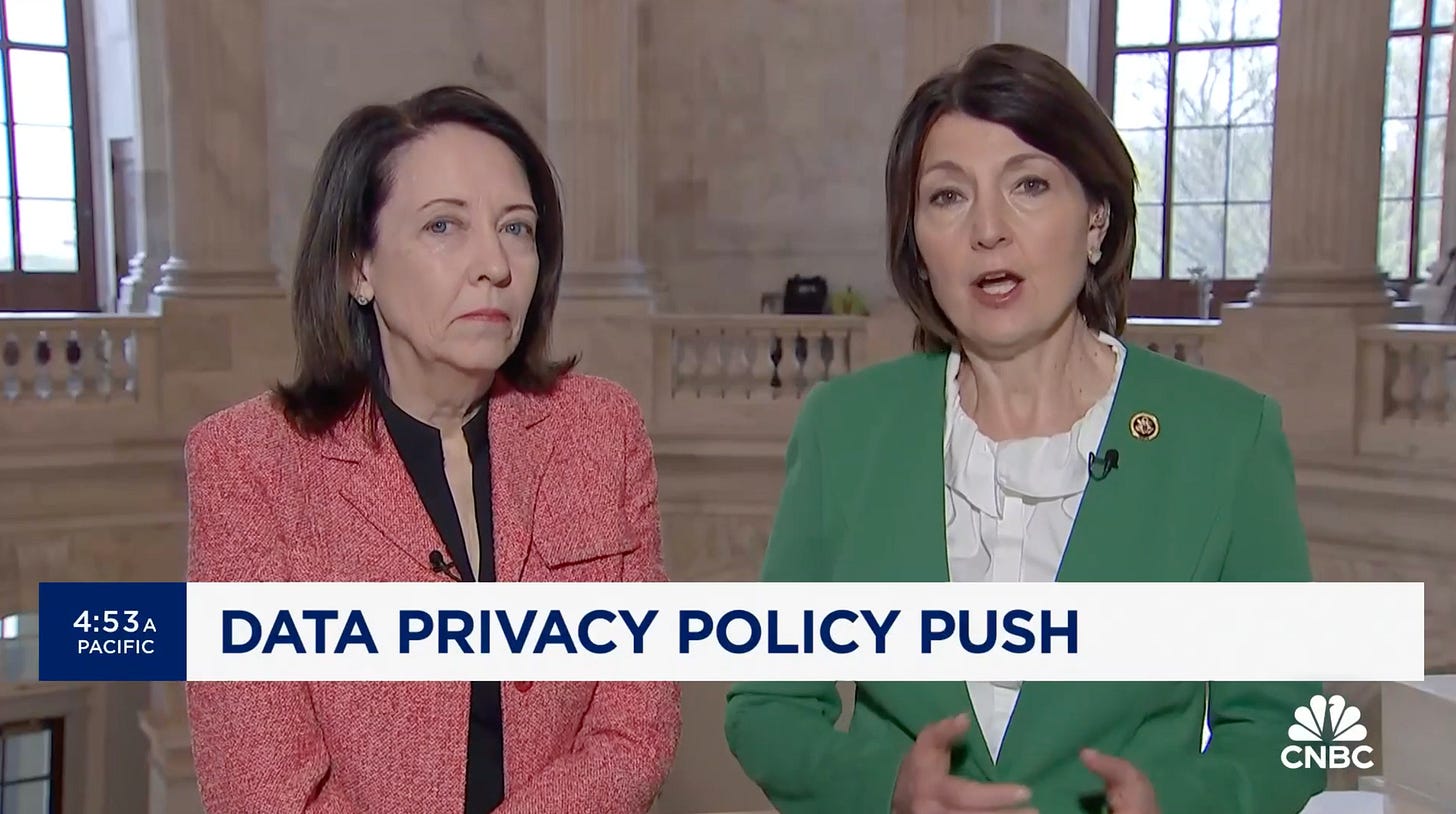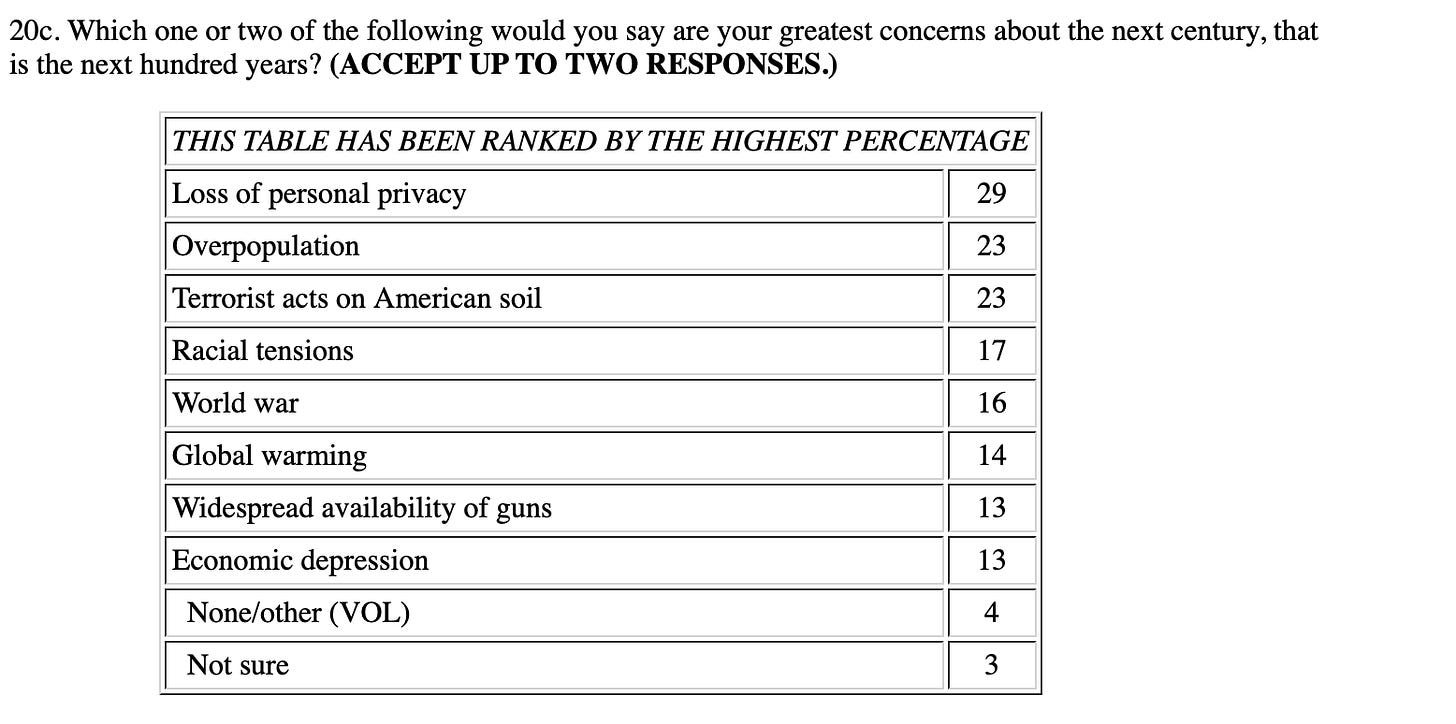“Senators are people too”: Inside the bipartisan data privacy push
Congress has never passed a comprehensive data privacy bill in the digital era. Two lawmakers are trying to change that.

Good morning! It’s Friday, April 12, 2024. Election Day is 207 days away. If this newsletter was forwarded to you, subscribe here. If you want to contribute to support my work, donate here.
A quick note before we begin: Today is the 13th anniversary of Wake Up To Politics — my newsletter bar mitzvah! I can’t thank you all enough for reading and supporting WUTP these past 13 years. I’m very excited for what the coming years will bring.
It’s been a while since I’ve sent out a subscriber survey, so I’d love to take this opportunity to check in to make sure WUTP is filling your news needs as best I can. Click here to fill the survey out. It will only take a minute!
And now, onto your weekly case study of bipartisan governance — plus more examples of government function from the past week:
A potential paradigm shift for data privacy
It has been almost 20 years since the mathematician Clive Humby observed that, in the internet era, “Data is the new oil.”
The comparison is apt. Both are ubiquitous, valuable, and critical resources that fuel the modern economy. Both are sometimes helpful, sometimes harmful, and rarely irrelevant. There’s one place the comparison falls flat, however: While oil industry is one of our most heavily regulated industries, the U.S. government has never made a comprehensive effort to regulate the use of online data — even in the decades since Humby’s observation, when Big Tech has only become more intertwined in our everyday lives.
It hasn’t been for lack of trying. Over the years, numerous data privacy bills have been introduced in Congress, only to fall flat. This week, Sen. Maria Cantwell (D-WA) and Rep. Cathy McMorris Rodgers (R-WA) launched a new bipartisan effort when they unveiled a draft of the American Privacy Rights Act (APRA). Cantwell, the Senate Commerce Committee chair, and Rodgers, the House Energy and Commerce Committee chair, are a formidable pair: one Democrat, one Republican; one senator, one House member; both powerful committee leaders.
The APRA would, for the first time, create a nationwide standard that gives Americans the right to control how tech companies use their personal data. Companies would be prohibited from collecting location, financial, medical, and communications data “beyond what is necessary, proportionate, or limited to provide or maintain a product or service requested by an individual.” Consumers would have the right to:
Access and delete the data collected on them by companies.
Opt out of their data being used for targeting advertising
Prevent their data from being transferred to a third party.
The measure builds on the American Data Privacy and Protection Act (ADPPA), a similarly bipartisan 2022 effort which was blocked by then-Speaker Nancy Pelosi (D-CA) from receiving a House vote. On the two major hang-ups that impeded the ADDPA, Cantwell and Rodgers managed to ink a compromise:
Democrats won on the question of whether consumers would be able to sue if companies violate the measure. Under the new bill, Americans would be able to file civil lawsuits, seeking financial damages from tech firms if their privacy rights are violated.
Republicans won on the question of whether the bill would preempt tougher data privacy bills passed by the states. The measure would impose a single nationwide standard, which would give Americans more protections in most states — but lower the protections in states like California, which has a tougher privacy law on the books.
Cameron Kerry, who worked on data privacy as a top Commerce Department official in the Obama administration, told me that the new bill, if enacted, would “change the paradigm” in data policy. While tech firms currently abide by a model of “notice and consent” — in which they give you a lengthy privacy policy and then you click “yes” — the APRA would shift to a “data minimization” model, in which the onus moves to the companies to prove that every byte of data they collect is strictly necessary.
“We need a system that puts the burden on the companies that collect and use data to do that in ways that are are appropriate to the interests and the expectations of individuals involved,” Kerry said.
Data privacy legislation is widely popular, across party lines: in a Pew Research poll last year, 78% of Democrats and 68% of Republicans said the government should more strictly regulate what companies can do with Americans’ personal information.
The Cantwell-Rodgers measure follows years of congressional fits and starts on the topic. At the very beginning of the Internet age, public pressure for privacy legislation was high. In September 1999, when Americans were asked in a Wall Street Journal poll to name their top concerns for the next century, “loss of personal privacy” sat atop the list. It beat out terrorist attacks, racial tensions, world war, and global warming.
By 2000, then-Sens. John McCain (R-AZ) and John Kerry (D-MA) had introduced the first major bipartisan data privacy bill; energy started to build behind it in Congress.
“But then, 9/11 happened,” Peter Swire, who served as chief counselor for privacy in the Clinton White House, told me. “When September 11th happened, the focus shifted from protecting privacy to protecting security. And one of the slogans after 9/11 was ‘we have to connect the dots,’ which meant that we had to have access to a lot more personal information.”
It would take years for the data privacy movement to recover its momentum. In 2011, a full decade after the attacks, McCain and Kerry teamed up again to offer the Commercial Privacy Bill of Rights Act. Once again, it went nowhere. Washington effectively delegated data policy to two other power centers — Brussels and Sacramento — as the European Union and California issued sweeping data regulations that American companies were largely forced to comply with.
Eventually, the next turning point arrived in 2017, when it was revealed that the political consulting firm Cambridge Analytica had harvested the data of up to 87 million Facebook users without their consent. “There were so many users of Facebook who were suddenly awakened [after the scandal] to the amount of data that was collected and how easily that data could flow out to complete strangers,” Cameron Kerry said. “That increased the concern.” (Cameron Kerry is former Sen. John Kerry’s brother. For a brief period in 2013, Cameron was acting Commerce Secretary and John was Secretary of State, the only time in U.S. history that two siblings have served together in the Cabinet.)
That new surge of momentum led to the ADPPA in 2022 — which was backed by Rodgers but not Cantwell — and now the APRA, which is supported by them both.
Rodgers, who is retiring in January, is moving quickly to advance the legislation. Along with ranking member Frank Pallone (D-NJ), she has already announced an Energy and Commerce hearing on APRA for next week. The panel will also consider other related bills, including the Kids Online Safety Act (KOSA), a major bipartisan measure which has filibuster-proof support in the Senate. (KOSA and APRA could theoretically be packed together, potentially along with the bill to force a sale of TikTok).
But the privacy bill is still a long way from becoming law. In the Senate, Commerce Committee ranking member Ted Cruz (who has recently been trying to rebrand himself as a more bipartisan legislator) has been noticeably unenthusiastic. The same inertia that plagued previous efforts could still haunt APRA — but the landmark agreement is still a historic start.
Rodgers told a newspaper in her district that their shared Washington state roots helped her and Cantwell arrive at a deal. “It’s been an exercise in building trust,” she said. “We come from a state that has a large tech presence, a state that has led in technology, and I think all of that has played a part in bringing us together at this moment. And it really is a significant moment for us to lead, both for Washington state and for the nation.”
Swire, meanwhile, has another explanation for why data privacy has attracted a striking level of much bipartisan support over the years, from McCain/Kerry to Cantwell/Rodgers.
“I have a theory that senators are people too,” he told me. “Senators have spouses and kids and grandkids, and they don’t want every detail of their personal lives being spread across the internet.”
According to Swire, when George W. Bush entered office in 2001, the new president’s advisers considered repealing privacy rules issued by the Clinton administration to implement the Health Insurance Portability and Accountability Act (HIPAA), which Swire had helped craft.
“And from what I’ve heard, he asked whether his daughters’ privacy would be protected if they went into the hospital somewhere. And the advisers had to say, ‘Mr. President, no, it wouldn’t be. It would be up to the hospitals.’ And then, according to what I’ve heard, which I believe, President Bush said, ‘Well, let’s have these protections in place.’”
“So the simplest explanation for bipartisan support,” Swire continued, “is that individuals across the political spectrum can worry about government surveillance, and can worry about corporations knowing all sorts of things about them without their knowledge or control.”
Here are more examples of government function from this week in Washington:
Bills introduced in Congress
🖥️ Speaking of online privacy, Reps. Tim Walberg (R-MI) and Kathy Castor (D-FL) introduced the Children and Teens’ Online Privacy Protection Act, which would prohibit internet companies from collecting personal information on 13- to-16-year-olds without their consent and ban targeted advertising for children and teens. The bill, known as COPPA 2.0, will be marked up in committee next week along with APRA.
🦺 The Maryland congressional delegation — seven Democrats and one Republican — teamed up to introduce the bipartisan Baltimore BRIDGE Relief Act, which would pay for the full cost of rebuilding the Francis Scott Key Bridge, which collapsed last month.
🪖 Sens. Elizabeth Warren (D-MA) and Joni Ernst (R-IA) introduced the Blast Overpressure Safety Act, which would “force the military for the first time to track and limit troops’ exposure to damaging shock waves from firing their own weapons,” according to the New York Times.
✡️ Sens. Jacky Rosen (D-NV) and James Lankford (R-OK) introduced the Countering Antisemitism Act, which would establish a National Coordinator to Counter Antisemitism, a White House official who would be charged with overseeing federal efforts to combat antisemitism.
⚖️ Here’s an interesting case where the two parties are trying to tackle the same problem, but offering different plans to do it. The problem is “judge shopping,” a tactic where litigants go to specific like-minded judges to challenge federal policies, in order to secure a nationwide injunction that will invalidate the policy across the country. Senate Majority Leader Chuck Schumer (D-NY) introduced the End Judge Shopping Act, which would require federal district courts to randomly assign judges to civil cases that could with nationwide consequences. (Some courts currently assign one judge to such cases.) Meanwhile, Senate Minority Leader Mitch McConnell (R-KY) offered the SHOP Act, which would simply end nationwide injunctions entirely by limiting judicial orders to only impacting their districts.
You don’t often see any much movement in Congress at all — certainly not across party lines — to use legislative power to shape the judicial branch, so these bills are notable, even if each of them only have support from one party.
House and Senate votes
👷 The House voted 378-26 to pass A Stronger Workforce for America Act, which would boost funding to programs that focus on “upskilling” American workers, improving adult literacy, offering work-based learning to young Americans, helping individuals released from incarceration transition back to employment, and strengthening workforce education programs at community college.
🏕️ The House unanimously passed the EXPLORE Act, the first-ever comprehensive package aimed at expanding access to outdoor recreation on public lands and waters. Among other provisions, the bill would create new long distance bike trails; fund programs to increase recreation access for veterans, economically disadvantaged individuals, and students; streamline the permitting process for guides and outfitters; and codify protections for rock climbing on federal lands.
🤝 Most Native American reservations in the U.S. — about 56 million acres of land in total — are technically owned by the federal government and held in trust for the tribes. Under a 1955 law, tribes are only allowed to lease their trust land for up to 25 years at a time. The House voted unanimously to pass a bill that will allow tribes to lease the land for up to 99 years, giving them access to economic development opportunities that require a longer-term lease.
👩⚖️The Senate voted unanimously to confirm Ann Marie McIff Allen as a U.S. district judge in Utah. It was the chamber’s first 100-0 roll call vote since April 2022. (Unanimous matters are generally resolved by voice vote.) The chamber also confirmed two other district judges, placing President Biden’s number of judicial confirmations (193) even with former President Donald Trump’s at this point in his term.
🇦🇫 The Senate unanimously passed a resolution calling on the Taliban to release Ryan Corbett, a Kentucky man who has been detained in Afghanistan without charges since August 2022. In a rare move, the resolution was jointly introduced by Senate Majority Leader Chuck Schumer (D-NY) and Minority Leader Mitch McConnell (R-KY). Corbett’s 41st birthday is tomorrow.
🛝Congress occasionally designates private museums as “national museums,” a purely symbolic label that has been given to the National Museum of Dentistry, the National Museum of American Jewish Military History, and the National Museum of Wildlife Art, among other institutions. This week, the House voted 385-31 to designate Rochester, New York’s Strong Museum — the only collections-based museum in the world devoted solely to the study of play — as the “National Museum of Play.”
🐢 The House passed bills aimed at conserving neotropical migratory birds, rescuing stranded seas turtles, and implementing the South Pacific Tuna Treaty.
Executive branch actions
Meanwhile, a roundup of news from the executive branch this week:
Biden and Japanese PM forge closer ties to counter China in Pacific region (Axios)
Biden’s latest debt relief would benefit 26 million Americans (Inside Higher Ed)
Biden administration sets first-ever limits on ‘forever chemicals’ in drinking water (AP)
Biden to close ‘gun-show loophole’ and expand background checks for firearms (Politico)
To cut cancer risks, EPA limits pollution from chemical plants (NYT)
Biden gives TSMC over $6 billion for advanced chips in U.S. (Semafor)
USPS proposes raising the prices of 1st class stamps to 73 cents (ABC)
More news to know.
Politico: Trump intensifies his grip on congressional GOP agenda
AP: Many say Biden and Trump did more harm than good, but for different reasons, AP-NORC poll shows
Axios: DNC covered Biden legal bills in special counsel probe
WaPo: States warn Biden could miss ballot. Dems say exceptions have been made for GOP.
Semafor: Japan’s Kishida pushes for Ukraine support before fractured US Congress
CNN: Trump is just days from his first criminal trial after latest legal gambit fails
The day ahead.
White House: President Biden will virtually address the National Action Network (NAN) annual convention. Later, he will travel to his Rehoboth Beach, Delaware, vacation home, where he will spend the weekend. Vice President Harris will travel to Tucson, Arizona, to deliver remarks on abortion, following the state Supreme Court’s decision to uphold an 1864 near-total abortion ban.
Congress: The House will try again to advance the Reforming Intelligence and Securing America Act, which would reauthorize and reform Section 702 of the Foreign Intelligence Surveillance Act (FISA), a key surveillance tool. The Senate is on recess.
After the FISA vote, with his job on the rocks, Speaker Mike Johnson will seek to curry former President Donald Trump’s favor by flying to Mar-a-Lago for a joint event with Trump on “election integrity.”
Supreme Court: The justices will meet for their weekly conference.
Before I go...
Don’t forget to take the 13th anniversary survey to let me know how I’m doing informing you. You can find the survey here.
And, of course, if you want to mark the anniversary by donating to WUTP — to make sure I can keep writing the newsletter into Year 14 — you can do so here.
Thanks for reading.
I get up each morning to write Wake Up To Politics because I’m committed to offering an independent and reliable news source that helps you navigate our political system and understand what’s going on in government.
The newsletter is completely free and ad-free — but if you appreciate the work that goes into it, here’s how you can help:
Donate to support my work or set up a recurring donation (akin to a regular subscription to another news outlet).
Buy some WUTP merchandise to show off your support (and score a cool mug or hoodie in the process!)
Tell your family, friends, and colleagues to sign up at wakeuptopolitics.com. Every forward helps!
If you have any questions or feedback, feel free to email me: my inbox is always open.
Thanks so much for waking up to politics! Have a great day.
— Gabe




